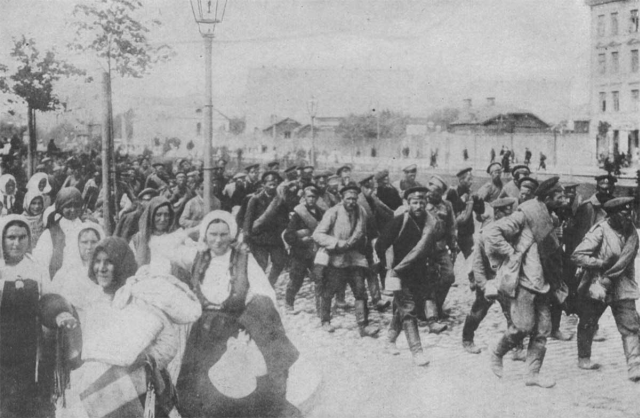Letters from the Great War
Letters dating back to the Great War are an important source for historians.

Steliu Lambru, 05.01.2015, 13:42
The Great War shaped mankind profoundly. The conflict also brought about the largest display of human and material forces, and left behind winners and losers. The trauma was the same on both sides of the conflict, making warring factions connect and amplifying fleeting moments of humanity.
Letters dating back to the Great War were an important source for historians to ascertain what those in the trenches felt and had to deal with. The National Military Museum in Bucharest hosts a collection of 120 such letters and postal cards, belonging to Romanian military who fought in the First World War. Historian and curator Carla Duta told use more about the feelings, sorrows and hopes of those who died for the ideals they believed in 100 years ago.
Carla Duta: “Romanian military on the frontline more often than not wrote to their families, to their spouses, their mothers or children. One example is the collection of letters addressed by Col. Alexandru Stoenescu of infantry battalion #10 to his wife, Elena. There’s a series of 12 military post cards, each addressed to ‘Dear Lunca’ and ended with ‘I love you all so much, kisses, Alexandru’. All the 12 letters are dated 1916, at the time when the colonel was deployed on the Dobrogea frontline and was slightly wounded. I will briefly quote from these letters: ‘Dear Lunca. I am in good health, God willing. Our battalion fought well on September 6, 1916 and was awarded the daily reward. This brought great joy to my heart. In another letter I was mentioning that a bullet pierced my left ear. My wound has now almost fully healed. What’s the story with the zeppelins? Here we are under artillery fire every day. Kisses to you all, Alexandru.”
Overwhelmed by the great hardships they underwent, soldiers on the battlefield had mixed feelings:
Carla Duta: “The emotions, experiences and hopes of Romanian military on the frontline transpire in the letters and postcards sent to their families. They were all willing to sacrifice themselves for the Romanian ideal which animated their every action, but at the same time they were deeply concerned about their loved ones back home, who more often than not had no support and were living in dire straits. Here is an excerpt from a letter sent by Pascal Radulescu from the 1916 campaign in Flamanda: ‘I will never forget the moment when, wading through the shallow water, my machinegun broken by a bullet, I was carrying my beloved and dedicated sergeant in my arms, whose brains had been pierced by a bullet. I ordered the bugler to sound the attack and charged in, empty-handed and baffled’. The emotion in these lines, the optimism, the faith people placed in God in those times of despair, manage to reach and shake us. Quoting from another letter: ‘The Germans and Bulgarians were fleeing the battlefield, fearing the points of our bayonets. But Romanians showed no mercy for those who stayed behind’.”
Carla Duta managed to reconstruct episodes from the war based on the letters:
Carla Duta: “Some letters depict very impressive pictures of the war. The short format of the postcard did not allow the sender to write at great lengths. Still, the collection of letters sent by Alexandru Stoenescu depicts a few such scenes. Quoting from one of his postcards: ‘On September 6, 1916 our regiment entered the battle. I have never seen such atrocious fighting. Our regiment’s numbers were cut to half. God was kind enough to spare me though. We have 20 wounded officers and the battlefield is filled with corpses of Bulgarian soldiers. Our ferocious attacks have sapped their morale and they’re now pulling back. We’ve taken over their positions, now overrun with corpses’. Then there are letters describing scenes from the war in great detail, and the letters are thus more impressive. Here is how a military from Moldova describes an episode from 1917: ‘The Germans are having a hard time, they keep defecting to our sides. They say they have nothing to eat. As soon as they get their heads out of the trenches our soldiers grab them. A couple of shells passed over our heads just now. This is what war is like.”
How did Romanian military see their presence on the battlefield? Carla Duta quoted a fragment from the letter of a father to his son, private Vasile Florescu. The letter is dated 1917:
Carla Duta: “Dear son, today Mr. Niculescu brought me your letter. You will win this war, I am sure. Don’t forget who your ancestors are and make your people proud. It has fallen on you to fight so that we should keep our land, bled by the enemy occupation. Have no fear for your life, for you have pledged it to your king and country. May the thought of forging a Greater Romania lift your spirit and cast away your doubts. For dying for your country means dying a hero’s death. So discard any thoughts deterring you from the sacred cause of victory. May your actions be worthy of your words and thus you will have your father’s blessing. Your mother and brothers want to see you return victorious and pray dearly for your safety and for victory. Send my greetings to your brothers in arms and may God give you strength. Vasilica, my son, don’t ever forget that no one in your family has ever been a coward and that honour has always been our family’s motto.”
Great victories are written in blood, there’s no denying and mail from the Great War fully confirms this indisputable truth.






























